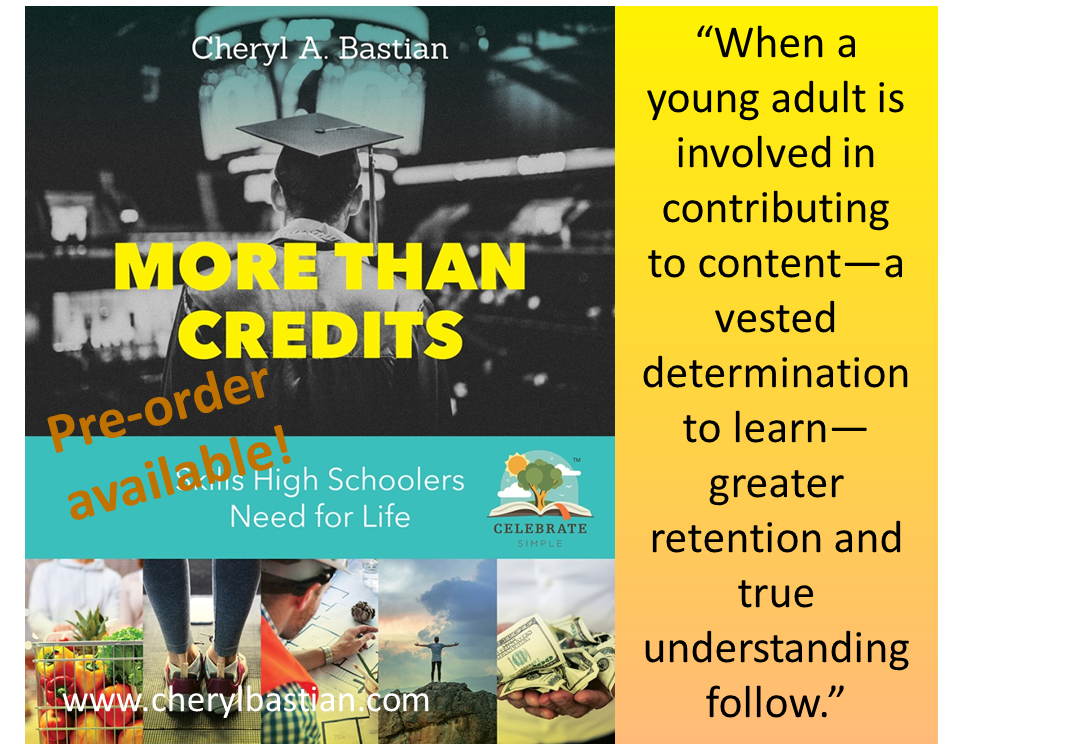Experiential Learning in High School : The Motivation
/Motivation Matters
When a young adult is involved in contributing to content—a vested determination to learn—greater retention and true understanding follow.
Young adults thrive when there’s purpose. If something matters to them, they become invested and personally motivated. When parents give their children freedom where responsibility is evident, growth potential flourishes. The more young people become responsible, the more confidence they gain. It’s a perpetual cycle, much like the ebb and flow adults face.
Our sons were passionate about baseball. Both were pitchers, one a righty and the other a lefty. Improvement in skill and arm strength required discipline, daily workouts, and throwing. What fueled their passion? Motivation to be the best pitcher he could be as well as knowledge of what was needed to meet the goal. It wasn’t me. I hadn’t any idea how to build arm strength or design a workout. Instead, the boys listened to coaches, consulted with trainers, and implemented or tweaked their plans. I encouraged them, served as their cheerleader, drove them to practice, and figured out how to incorporate and communicate all they were doing into credits. Many of the activities they integrated into their days are listed in this resource.
The content suggestions listed in these five personal development electives aren’t meant to be objectives to be checked off, tested, and graded. They are chunks of knowledge which can be gleaned from life, fully understood in the context of life experiences. Will resources—print, digital and personal contacts—be needed? Likely, yes! And, the lists I provide aren’t meant to be exhaustive. They can’t possibly be because each high schooler—and their circumstances—is unique. Their courses will be as well.
Many of the ideas or projects listed in this book stem from real-life scenarios or situations our children—or the hundreds of high schoolers we’ve worked with—faced or were curious about. You will notice much of the content will be learned from naturally-occurring conversations, often because of a young adult’s interest, personal need, or life circumstances. These discussions were often catalysts for deeper study, additional conversations, or visits to the library…and our high schoolers earned credit!
Later in the chapter….
For learners who have an inkling of what their post-high-school paths will be, they will move forward in that direction. Along the way, they will need help to process and question. They will seek out people who are willing to listen. Likely that person may be you! Embrace it. The conversations may feel constant and never-ending. However, the reality is that the time will be very short. As you help process your high schooler’s ideas, keep an open perspective. Be ready for change. An interest one semester may transform into a niche the following semester. It really can be a beautiful personalized journey.
Let’s say your high school learner is interested in pursuing a career in veterinary medicine. Talking with her, you believe the next right step would be to talk with professionals in the field. As move through the brainstorming process, you and your daughter make a list of venues which could be possibilities for volunteering or job-shadowing experiences: a vet's office, a local clinic, and the county animal shelter. As you discuss how to prepare for possible conversations with professionals, you list questions which could be asked in an interview situation. They may include
What universities are considered optimal for preparation of a career in this profession?
What are the potential degree and career paths available?
What classes or experiences were most helpful to you in the education process?
What are the specialty areas in this profession?
What areas, in any, do you recommend or foresee might be most helpful five years from now?
What would you, as a professional, recommend for a young adult pursuing this career?
(Excerpted from More than Credits: Skills High Schoolers Need for Life)
Perhaps your high schooler is motivated to learn more. You may not feel you have the expertise or the knowledge necessary to help your young adult move forward. Guess what? You are not alone. And, you don’t need to know the answers. There are people in your high schooler’s field of interest who do, people who work in the profession. Seek them out.
Wondering what types of questions you and your learner could brainstorm together? I offer ideas in this post. This is a sampling in what you will find in More than Credits: Skills High Schoolers Need for Life.





